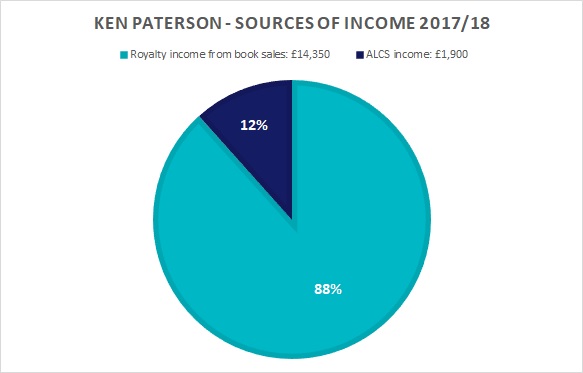I have been a freelance writer – mainly of grammar practice books for students learning English – since 2011, earning £15,000 - £20,000 per year in that time, derived entirely from royalties on print books, and photocopying fees from ALCS.
I first started writing in 1994, when Oxford University Press commissioned me, in my role as director of English language teaching at the University of Westminster in London, to write a short grammar practice book at elementary level. I didn’t expect much in the way of income – my closest colleagues in degree-level linguistics would smile somewhat ruefully when they got royalty cheques of £70 or £80 – and was therefore rather surprised to receive a payment of around £10,000 for six months of sales in 1996.
 Over the next decade, the book was re-packaged, combined with higher levels, updated and translated, until I had enough money saved to buy myself out of my day-job for two years, and begin work on two original projects: a pedagogical grammar of conversation (based on the results of recent computer research) and a novel inspired by a visit to Cordoba and some strange thoughts on a late evening walk through Regent’s Park.
Over the next decade, the book was re-packaged, combined with higher levels, updated and translated, until I had enough money saved to buy myself out of my day-job for two years, and begin work on two original projects: a pedagogical grammar of conversation (based on the results of recent computer research) and a novel inspired by a visit to Cordoba and some strange thoughts on a late evening walk through Regent’s Park.
Back in full-time employment in 2007, I continued work on these projects (at a much slower pace) until 2010, when I was simultaneously offered voluntary redundancy in a university-wide scheme, and contracts for three new grammar books, two from Oxford University Press and one from Palgrave Macmillan. The time seemed right, with two personal projects and three new, more commercial contracts, to go freelance.
In 2015, with the three new contracts fulfilled, and the conversational grammar published by Delta (A Handbook of Spoken Grammar), I sat back, as a writer almost totally dependent on print book sales from a single publisher, took my first real look at the changing publishing landscape around me, and decided to throw myself into the digital world, an arena in which I had no expertise whatsoever. The aim would be to launch a professional website; design, film and publish two online, fee-earning courses for English language teachers; and attempt to get a good review of my novel, before self-publishing it electronically.
Three years later, the website is live (www.kenpatersonwriter.com); the courses are scripted and filmed, but await video-editing – too complicated for me – by a professional; and the novel (The Story of the Cloth) got a favourable review from Kirkus Reviews, and is now available as an e-book. As for the income potential of these new online ventures … who knows?

Looking back, it feels as if I’m straddling two entirely separate worlds. The first – conventional print book publishing by one of the major educational houses – offers you guidance or even a format, advances, reasonable rates of royalty, free editing support, marketing and promotion. (But it may be disappearing: younger writers talk discouragingly of one-off fees for smaller projects or parts of books.)
The second, self-publishing, digital world has a gung-ho, risk-taking appeal to it, and may allow for more creative and original products, but demands market research skills, a certain level of technical know-how and plenty of promotional savvy. It also meant, in my case, a significant level of investment in paid-for support (website design, copy and video editing, proofreading and book distribution).
According to a talk I recently attended, I’m now a ‘hybrid author’, and that’s the way, the speaker suggested, that we should all be going in these uncertain times. We’ll see.